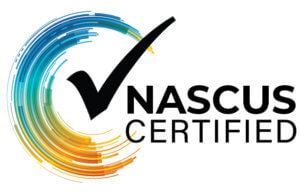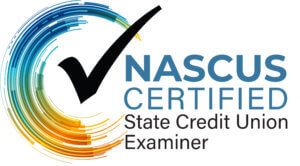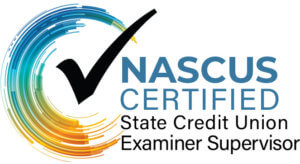NASCUS Examiner Certification Program

NASCUS Examiner Certification Program for State Regulators
The NASCUS Certification Program for state regulators provides professional recognition of superior standards to state credit union examiners and encourages further development through required continuing education hours. Participation in the Certification Program is open to all state credit union examiners who complete the necessary requirements. Participation in the program is voluntary.
*This certification is for state-level examiners only.
Click here for the Application for Certification Certificates will be sent to qualifying applicants at the end of each week.
General Information Contact: For general questions or additional resources about either the Accreditation or Certification Programs, please contact: John Kolhoff, SVP of Policy and Supervision
Already Certified? Add your certification accomplishment to your LinkedIn Page by clicking on one of the icons below.
Certification Benefits
For Individual Participants: Certification acknowledges expertise, increased proficiency and promotes the confidence and recognition that comes with meeting and adhering to demonstrable national standards of professionalism. Certified examiners also receive select NASCUS updates, information, and learning/collaboration opportunities.
For State Credit Union Departments: Certification of examiners increases the efficiency and proficiency of department staff and enhances the credibility of the department.
For State Credit Unions: Certification of examiners ensures that state credit union examiners subscribe to a professional code of ethics, have the experience and skills required to effectively examine state-chartered credit unions, and participate in advanced continuing education classes.
Certification Levels and Requirements
There are two levels of certification:
- Certified State Credit Union Examiner (CSCUE) and
- Certified State Credit Union Examination Supervisor (CSCUES)
Requirements: Certification requires evidence of the successful completion of appropriate coursework, evidence of appropriate on-the-job experience, and the approval of a superior attesting to satisfactory performance of the key skill-sets required for the level of certification sought.

Certified State Credit Union Examiner (CSCUE)
Requirements to become a Certified State Credit Union Examiner include:
- Completion of a minimum of 18 months’ on-the-job training related to credit union examination, including credit and operations review; and,
- Successful attendance and completion of credit union-related New Examiner training
- Satisfactory completion of 28 hours of training annually
All course types will be considered including in-person training, online webinars, online course modules, and any other internal training related to credit union examination an agency provides to staff.
Completion of the application is considered a formal attestation of accuracy for all information submitted. Supervisory approval is required before an application will be processed. Supervisory approval can be submitted in an email to John Kolhoff, SVP of Policy and Supervision

Certified State Credit Union Examiner Supervisor (CSCUES)
Requirements to become a Certified State Credit Union Examiner Supervisor include: Completion of all requirements of the Certified State Credit Union Examiner.
-
- Completion of a minimum 12 months of on-the-job service and training related to a management/supervisory role and as EIC.
- Satisfactory completion of at least three advanced level courses related to credit union examination, regulatory supervision of credit unions, and/or management level training.
-
- Completion of the application is considered a formal attestation of accuracy for all information submitted. Supervisory approval is required before an application will be processed. Supervisory approval can be submitted in an email to John Kolhoff, SVP of Policy and Supervision
Re-Certification
Every three years, participants will be required to provide evidence of the successful completion of 84 continuing education hours for the three-year certification period
Cost: The cost of participation is currently covered by the National Institute of State Credit Union Examiner (NISCUE) funds and is automatically applied with every approved application.
Certification Code of Ethics
All credit union examiner personnel have ethical responsibilities and obligations that are due to the public and the profession. Failure to adhere to the Code of Ethics can result in immediate termination of certification. It is expected that participants in the NASCUS Certification Program shall:
- Refrain from conduct that is detrimental to the public, the financial regulatory profession, and to the Certification Program;
- Not knowingly act in a manner that is misleading or fraudulent;
- Not violate the confidential nature of the examination process;
- Not engage in any activity that may give rise to the charge of conflict of interest or that may impair the independence of their judgment in the exercise of their duties
Use of NASCUS Certification
The term “NASCUS,” its certification designations and emblems are the property of the National Association of State Credit Union Supervisors and must be used in a manner that preserves and respects the full extent of NASCUS’ rights and interests.
Only when a certification designation has been granted may a participant utilize the designation’s acronym and/or a statement of having earned a NASCUS certification designation. Use of the certification designation is acceptable for, but not necessarily limited to, business cards, stationery and letterhead, resumes and curricula vitae, and professional correspondence. This includes the use of a signature logo sent to you in your welcome packet upon approval and renewal.
NASCUS requires that its certification designations be used only in strict conjunction with the name of the participant to whom it has been granted.
Any individual who is no longer participating in the Certification Program, for any reason (including but not limited to the nonpayment of dues, violation of the Code of Ethical Conduct, voluntary or involuntary termination of certification, etc.), must cease any and all use of the certification designation.

